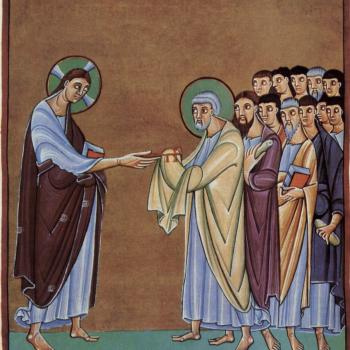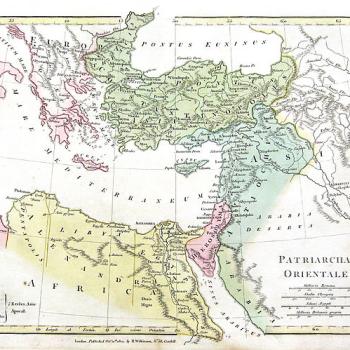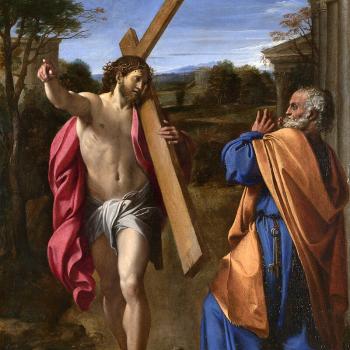
In the roughly fifteen years since I have become Catholic, I have become aware that there are those who recoil from the idea that the Catholic hierarchy exercises legitimate authority over men. As the Church teaches, this authority comes from God. Anecdotally, this “hard pill” of sorts is not limited to non-Catholics. I have heard roughly the same from at least one Catholic struggling to grasp this concept. Though all under discussion would agree that God has authority, not all would concur that this very power has been passed on to mere men, whether they be the Apostles themselves, or their successors (i.e. the bishops).
Thus, there appears to be a false dichotomy between God and men when it comes to the question of authority. The apparent contradiction, no doubt exacerbated by misunderstandings of Acts 5:29 (“We ought to obey God rather than men”), disappears when one realizes these are not always mutually exclusive propositions. On the contrary, what if Jesus Christ Himself established that, before He ascended to Heaven, the Apostles and those who succeed them should exercise the authority of God Himself?
Such is the teaching of the Catholic Church: “In order that the full and living Gospel might always be preserved in the Church the apostles left bishops as their successors. They gave them their own position of teaching authority….” (CCC par. 77).[1]
In the present article, I wish to examine Luke 10:16 within the framework of an abiding authority, and how this specific text has been treated historically within the Catholic Church. The evidence presented is by no means exhaustive.
Luke 10:16
In the tenth chapter of his Gospel, Luke the Evangelist records Jesus as uttering the following words: “He that heareth you, heareth me; and he that despiseth you, despiseth me; and he that despiseth me, despiseth him that sent me” (v. 16).* It is clear from the context that a truly God-given authority is being handed over to the listeners. The question is whether this authority abides today? By utilizing this and several other Scriptures, the Catholic Church argues that “yes”, it does (cf. par.’s 880-881). Furthermore, I have given some examples below showing how this text has been understood throughout the centuries.[2]
St. Irenaeus of Lyon (ca. A.D. 189):
“Call to mind then, the things which I have stated in the two preceding books, and, taking these in connection with them, you shall have from me a very copious refutation of all the heretics; and faithfully and strenuously shall you resist them in defense of the only true and life-giving faith, which the Church has received from the apostles and imparted to her sons. For the Lord of all gave to His apostles the power of the Gospel, through whom also we have known the truth, that is, the doctrine of the Son of God; to whom also did the Lord declare: ‘He that hears you, hears Me; and he that despises you, despises Me, and Him that sent Me’ Luke 10:16”, (Against Heresies, Book III, Preface).
St. Augustine (ca. A.D. 410):
“On the words of the Gospel, Luke 10:16 , ‘He that rejects you rejects me’
…What our Lord Jesus Christ at that time spoke to His disciples was put in writing, and prepared for us to hear. And so we have heard His words. For what profit would it be to us if He were seen, and were not heard? And now it is no hurt, that He is not seen, and yet is heard. He says then, He that despises you, despises Me. If to the Apostles only He said, He that despises you, despises Me; do ye despise us. But if His word reach to us [i.e. the Bishops], and He has called us, and set us in their place, see that you despise not us, lest the wrong you shall do unto us reach to Him. For if you fear not us, fear Him who said, He that despises you, despises Me. But why do we, who are unwilling to be despised by you, speak to you, except that we may have joy of your good conversation? Let your good works be the solace of our perils. Live well, that you may not die ill.” (Sermon 52 on the New Testament)
Fourth Council of Constantinople, Canon 21 (A.D. 869-870):
“The word of God that Christ spoke to his holy apostles and disciples: ‘Who receives you, receives me’ [Mt 10:40]: ‘and whoever rejects you, rejects me’ [Lk 10:16], we believe was addressed also to all those who, after them in accordance with them, became supreme pontiffs and leaders of the pastors in the Catholic Church. We, therefore, determine that absolutely none of the ruling powers of this world shall dishonor or attempt to remove from his throne any of those who occupy patriarchal sees, but they must judge them worthy of all reverence and honor; especially the most holy pope of elder Rome; and also, in order of succession, the patriarch of Constantinople, then indeed those of Alexandria, Antioch, and Jerusalem…. ” (Denzinger 661, my emphasis).**
Pope Pius XII (A.D. 1950):
“20. Nor must it be thought that what is expounded in Encyclical Letters does not of itself demand consent, since in writing such Letters the Popes do not exercise the supreme power of their Teaching Authority. For these matters are taught with the ordinary teaching authority, of which it is true to say: ‘He who hears you, hears me’;[6] and generally what is expounded and inculcated in Encyclical Letters already for other reasons appertains to Catholic doctrine. But if the Supreme Pontiffs in their official documents purposely pass judgment on a matter up to that time under dispute, it is obvious that that matter, according to the mind and will of the Pontiffs, cannot be any longer considered a question open to discussion among theologians” (Humani Generis).
Second Vatican Council (A.D. 1964):
“Bishops, therefore, with their helpers, the priests and deacons, have taken up the service of the community, (11*) presiding in place of God over the flock,(12*) whose shepherds they are, as teachers for doctrine, priests for sacred worship, and ministers for governing.(13*) And just as the office granted individually to Peter, the first among the apostles, is permanent and is to be transmitted to his successors, so also the apostles’ office of nurturing the Church is permanent, and is to be exercised without interruption by the sacred order of bishops. (14*) Therefore, the Sacred Council teaches that bishops by divine institution have succeeded to the place of the apostles, (15*) as shepherds of the Church, and he who hears them, hears Christ, and he who rejects them, rejects Christ and Him who sent Christ (149)(16*)” (Lumen Gentium, 3:20).
Pope St. John Paul II (A.D. 1993):
“The moral prescriptions which God imparted in the Old Covenant, and which attained their perfection in the New and Eternal Covenant in the very person of the Son of God made man, must be ‘faithfully kept and continually put into practice’ in the various different cultures throughout the course of history. The task of interpreting these prescriptions was entrusted by Jesus to the Apostles and to their successors, with the special assistance of the Spirit of truth: ‘He who hears you hears me’ (Lk 10:16)” (Veritatis Splendor, 25).
[1] Cf. par.’s 880-881 on the relationship between the episcopate and the papacy.
[2] My emphasis will be evident in these quotes via bold and underline.
*All of my citations from Sacred Scripture come from drbo.org
**Note the citation from Tanner was replaced with that from Denzinger. See this article.













